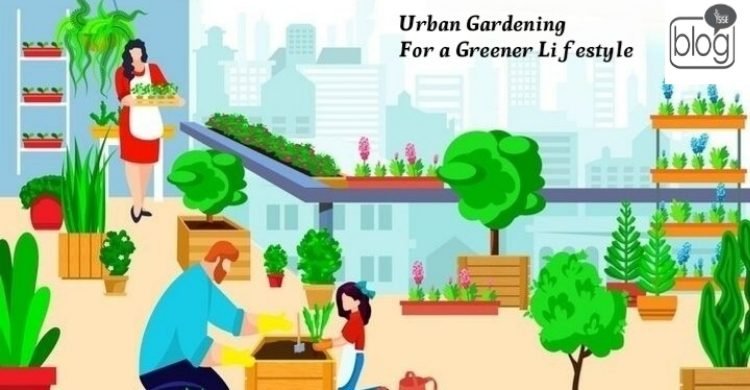What comes to your mind when you hear the term “urban gardening”? A tall building in a big city with a garden on top? Are kale and tomato plants flourishing in an above-ground planter on the balcony of a building? Urban gardening encompasses all of these traits, and there are several methods to get started.
Urban gardening has emerged as a powerful tactic in the fight for a more environmentally friendly future. This innovative approach enables city dwellers to reconnect with nature, encourage biodiversity, and live sustainably.
How to start urban gardening?
No worries!!
An urban garden can be started by anyone. How much you can grow in a little space will astonish you! Here some tips are given :
- Make a space first
Choosing a location is the first step in making an urban garden. This might be a sunny spot on your balcony, a portion of your shared rooftop garden, an alleyway, or some nearby land. In order to calculate how many pots you need, you must first measure the available space and choose the size of your garden.
- Pick your pots
No backyard? No issue.
A home garden is completely unaffected by the absence of a backyard. Simply upcycle any existing containers, used paint cans, or old crates into planters. You can easily move plants in and out of the sun as needed.
- Choose your plants
Why not harvest fresh herbs and vegetables from your urban garden? Grow your own vegetables and herbs to increase sustainability and your intake of fresh products. When planning your garden, keep in mind the specific vegetable, flower, and herb varieties that are easy to grow in urban environments such as vegetables with shallow roots, like lettuce and radishes.
- Sow seeds
You can decide whether to begin with mature plants or young seedlings. Your plant’s roots should go down into the container with some pebbles in the bottom to help with drainage once you remove it from the plastic pot holding the roots. Approximately 1 inch should be left at the top so you can water.
- Know your soil
Urban gardeners frequently neglect to ensure that their soil is of the highest caliber. While pesticide-infused soil may produce fantastic results, you don’t want your vegetables and herbs to flourish in a chemically-rich environment. A surefire way to keep your garden thriving and green is to add nutrient-rich soil amendments.
- Water your garden
Regular plant watering is the most crucial step in maintaining a healthy urban garden. It’s worth looking into some of the sophisticated watering systems available on the market that will keep your plants hydrated if you have the space and need some assistance with this.
Costs and Benefits
Urban gardening boosts biodiversity in cities by attracting a variety of animals, stimulate the preservation of rich topsoil, improve local microclimates, and facilitate the recycling of urban waste as a source of organic matter and soil nutrients. Some benefits are given below :
- Encouraging Community Involvement
Urban gardening fosters community involvement and social cohesion. Working on a garden project with others promotes social contact, strengthens community ties, and fosters a cooperative attitude. These gardens frequently serve as teaching facilities, offering workshops and classes on healthy eating, gardening, and sustainable living.
- Enhancing Food Security
Urban gardening provides a powerful solution by empowering individuals and communities to grow their own healthy food. Using the spaces that are available in cities, such as roofs or small patches of ground, urban residents can cultivate a variety of fruits, vegetables, and herbs.
This localized food production minimizes carbon emissions and aids in the development of a more sustainable food system.
- Minimizing negative effects of environment
Urban gardening is crucial for minimizing the damaging environmental effects of urbanization. Urban areas account for the majority of carbon emissions and air pollution, green spaces act as natural air filters to reduce the concentration of harmful pollutants.
- Enhancing physical and mental wellness
Urban gardening offers a much-needed respite from the busy and stressful lifestyle of the city. Spending time in nature can enhance mood, reduce stress, and generally support mental wellness. People can engage with nature and find solace amidst the hustle and bustle of daily life. The physical labor required to maintain a garden also promotes an active lifestyle and physical fitness.
The Green Revolution has embraced urban gardening as a way to live sustainably. Urban gardening has the power to transform cities into dynamic and sustainable habitats. By forming this habit, we may all greatly improve our personal lives, our communities, and the planet.
To read more blogs click here.
Writer
Ishrat Binte Rahman
Intern
Content Writing Department, YSSE

